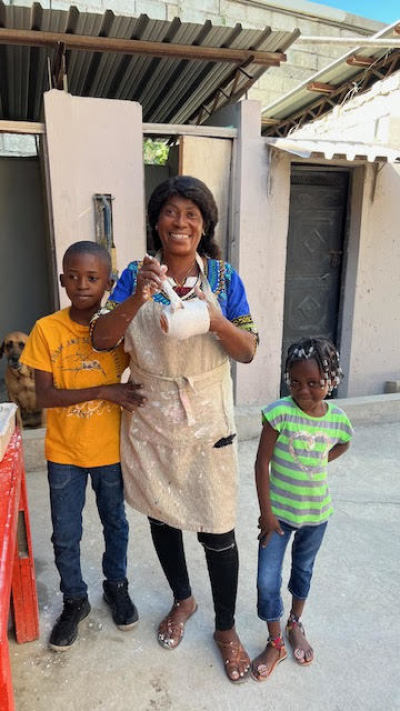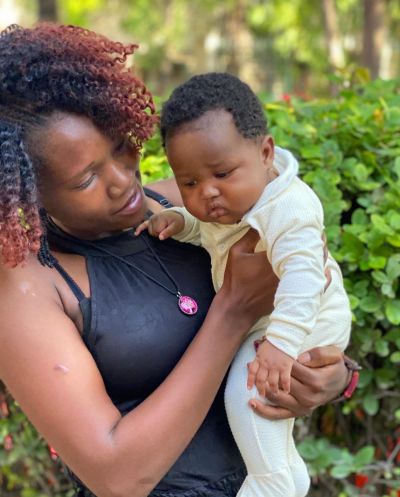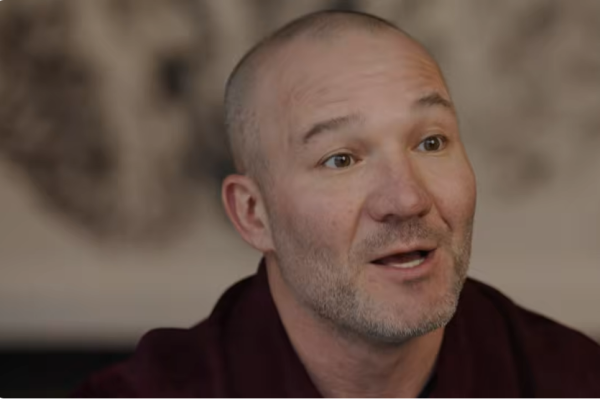Separated from her mother, but not for lack of love

Haitian families have experienced a near-constant threat of violence, housing instability and sickness for decades. And for the country’s single mothers, many of whom find themselves raising their families in extreme poverty, the challenges can be impossible to overcome.
This was almost the case for Makilene — an unemployed single mother of five. The children’s father had recently passed away, and Makilene was left with no way to provide for her family. In desperation, Makilene took her youngest child, a baby girl, to Port-Au-Prince in search of an orphanage. She felt this was the only way.
Miraculously, the “orphanage” she approached turned out to be an avenue for help for her whole family. Makilene met a woman who ran an organization, Papillon Marketplace, that connected vulnerable women with job opportunities. It wasn’t long before Makilene was earning a living as a jewelry maker, supporting her children under one roof on land she purchased herself.
Makilene's story isn’t unique — there are millions of women around the world who have overcome unimaginable circumstances and accomplished great things for their families. And this month, the United States is celebrating Women’s History Month — a month set aside to honor the significance of what women have accomplished. Really, this celebration is a reminder of the strength and virtue that has existed within every woman throughout history. And as someone who works in the child welfare space, it reminds me of women's essential role in the life of every child.
There are few things more worthy of celebration than a mother’s love.
But I’ve discovered through my involvement with the global family strengthening movement that, tragically, millions of children are growing up without their mothers in residential care facilities, like orphanages or children’s homes. What’s more, in most cases, these children have living mothers, aunts, grandmothers, or other extended relatives who could step into that maternal caregiver role if given the support to do so.

These children didn’t become separated from their mothers because of a lack of love, but like Makilene, they were women needing support. Yet orphanages continue to receive steady aid from well-intending donors, particularly U.S. Christians.
With a proper understanding of the vital role a mother plays in a child’s life, this could all change.
When I had my first son, I remember the profound experience of bottomless love and the deep connection between myself and my child. As a woman working in child welfare, I began to reflect on my own experience as a mother in relation to children in residential care around the world.
In the middle of the night, when I would rush down the hall to a shrieking newborn and feel him relax almost immediately upon being picked up, I would remember the children who weren’t picked up. Over time, many babies in residential care learn not to cry because it doesn’t result in the caring embrace of a parent. In the same way, as I watched my toddler take those brave first steps out onto the playground, looking back at my face in a moment of fear to make sure he was safe, I would remember the children who cling to strangers coming into their orphanage because they were so starved for connection.
Mothers play an essential role in healthy child development. A stable attachment between a mother or other caregiver and an infant will help set that child up for future success physically, mentally, and socially. Unfortunately, research has shown that growing up in an orphanage without the consistent care of a parental figure actually negatively impacts a child’s brain development.
Sometimes circumstances make a mother feel like she can’t carry out that essential role — like her only choice is to surrender her children to a residential care facility to ensure their basic needs are met. It’s a misconception that children in orphanages do not have loving parents. More commonly, it’s factors outside of a family’s control — poverty, lack of access to education, disability — that lead to children being placed in an orphanage.
Therein lies the importance of strengthening families. By working to build up communities and families directly, mothers will no longer have to relinquish their children to secure resources for them — they can reach their full potential in their most critical role.
A global network of these family-strengthening organizations already exists, and I have the privilege of working alongside many of them. My sincere hope is to see that network grow. In countries all around the world, these defenders of family are connecting women with job opportunities, ensuring children have access to education, providing medical assistance to children with disabilities, and the list goes on.
The impact is clear — we can transform families and communities when we invest in women. Research shows empowering women and supporting children creates better outcomes for both. But if we want to see this impact multiply, supporters of vulnerable children worldwide must redirect their aid toward family-strengthening efforts. It’s time we realize orphanages can never replace mothers.
This Women’s History Month, consider how you can support mothers and, in turn, care for orphaned and vulnerable children. Look for organizations that empower mothers to care well for their children in the way only they can. And pray for women who feel they aren’t nurturing their families and children as they should be — the power of their love in a child's life can’t be overemphasized.
Elli Oswald is the executive director of the Faith to Action Initiative.





















